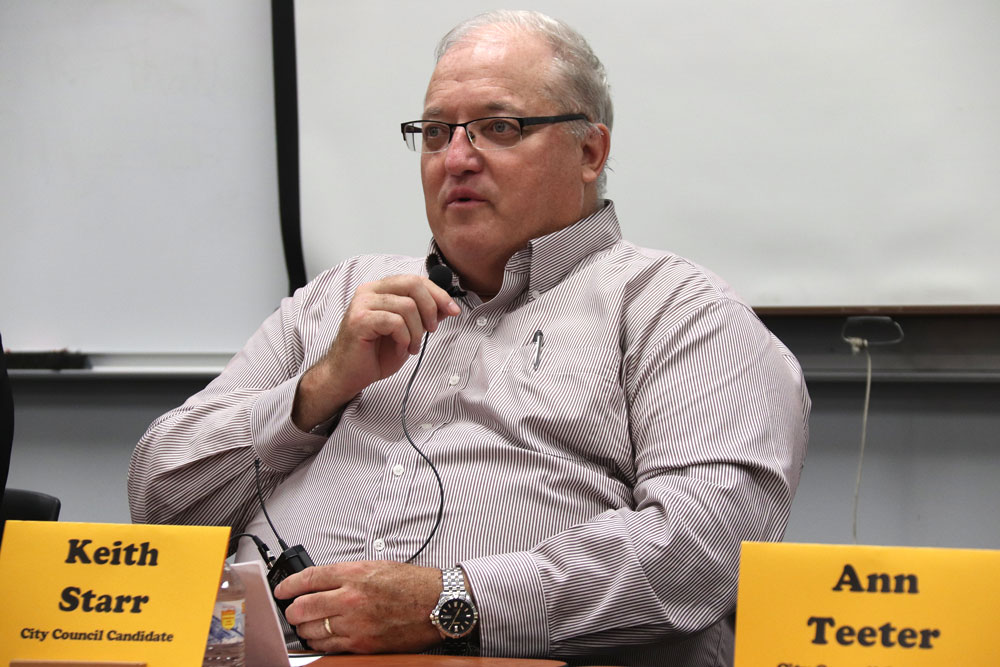A woman of all seasons
Former Comet returns to promote sport diversification

Wartburg softball coach Jamie Mueller and Wartburg softball player and 2014 CCHS graduate Mara Forsyth paid a visit to the athletes of Charles City High School on Thursday to encourage them to branch out athletically.
By Andrew Larson
sports@charlescitypress.com
CHARLES CITY — As a student athlete, specializing in one sport is fine and can help you become better in your chosen athletic pursuit, but being an all-around athlete can improve your performance not only on the field and/or court, but in the classroom and in many other facets of life.
This was the point being driven home on last Thursday by Wartburg softball head coach Jamie Mueller and her third baseman, Mara Forsyth, who paid a visit to the Charles City High School athletes to encourage them to diversify themselves athletically.
Charles City High School assistant principal Larry Wolfe introduced the pair to the athletes gathered in the CCHS cafeteria, noting that Mueller is from Aurora, Ill, where she graduated with a Bachelor of Arts degree in Business, and later graduated from Northern Illinois with a Master of Science and Electrical Engineering.
Forsyth is a 2014 CCHS graduate where she played volleyball, basketball and softball.
“She was a key component in a championship team; 3-time state participant. All-conference and All-district recognition in basketball, and All-State as an elite player in softball,” Wolfe said of Forsyth, now a sophomore at Wartburg. “More importantly she worked her tail off while she was here and she was a great student athlete and a great example for you guys.”
Mueller began the presentation by talking about several reasons why athletes choose to specialize in one sport, rather than playing two or three. The three reasons were parents, society, and coaches.
“A lot of parents see athletics as an investment for a future scholarship,” Mueller said. “They may be under the impression that specializing in one sport could lead you to a scholarship at the collegiate level.
“Sometimes coaches fail to see the big picture and they can be territorial over a player. If I have a really good player on my team … maybe I don’t want to share them with another sport.”
Mueller went on to note that coaches may tend to worry that their athletes may get hurt if they play another sport, or decide that they like the other sport better.
There are some benefits to specializing in one sport, Mueller explained, but the benefits come at the cost of the main reason why most students got into sports in the first place: Fun.
Mueller explained that in order to reach expert status in a sport, it requires deliberate practice, which means practice that lacks any inherent enjoyment and is done with the sole purpose of improving one’s skills.
“If you want to specialize in one sport for the purpose of being a better athlete later on, it’s more important that you have quality practice that focus on skill development, rather than fun practices which is probably the reason why you enjoy the sport in the first place,” said Mueller.
There are also potential consequences to choosing to specialize, Mueller went on to note, such as incurring injuries due to overuse or just losing interest in the sport due to having work at it so much.
Mueller went into depth on all the potential benefits and advantages to playing multiple sports. Several of which are improved health and wellness, including a decreased injury rate, as well as improved leadership skills and teamwork. Another benefit is mproved academic performance.
“This might seem weird to you guys because when you are playing sports you are super busy. You have school, you have practice, you have homework. You go to school, you go to a game, you go home and do your homework and you wake up the next day and do it all over again,” Mueller said. “You are busy, but research shows, and with my experience with college athletes this is also true, when you are in season you perform better academically.”
Mueller went on to explain that the reason for this is that the sport keeps the athlete on track and focused. They have a smaller window in which to get things done, which requires the athlete to focus more on their work, as opposed to during the offseason when they are more at their leisure.
Mueller said that skills learned through practicing one sport transfer to other sports, as well. For example, a person who has practiced throwing an overhand pitch for baseball may find that their work on the mound will help with their tennis serve, due to the similarity of the motions.
Forsyth spoke from the perspective of a student athlete.
“I’ve pretty much done it all,” she said. “I used to be on swim team. I ran cross country for a year, believe it or not, I ran track, I literally tried all the sports. There are going to be some you don’t like. It’s just realistic. You are not going to like every school sport there is.”
Forsyth went on to explain that the athletes who get the most recognition are not the ones who are great at just one sport, but the ones who are all-around great athletes.
“How many of you want to be known?” Forsyth asked the audience. “You are going to be known if you are an all-around great athlete. You may be in the headline if you are all-state for cross country. Great, you’ll make it in for that season. What about basketball? Do you want to be in there for basketball? Do you want to be in there for baseball, for softball, and for volleyball? People know the great athletes. They don’t know the just one-great-sport athlete. They know the great overall athletes.”









Social Share